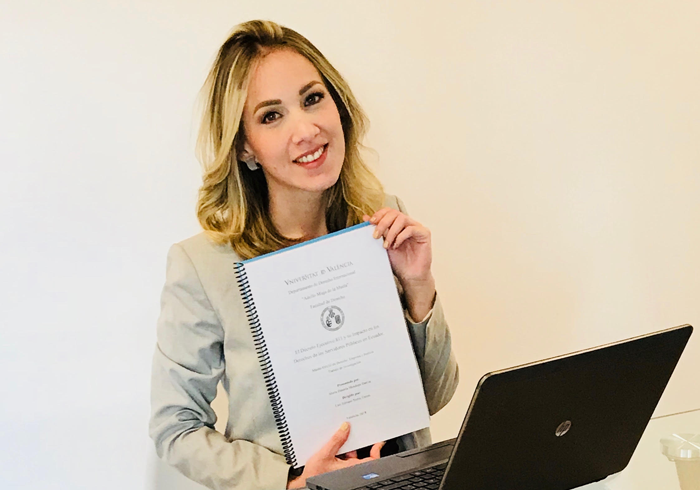
Daniela Mendoza successfully defended her Final Project “Executive Order 813 and its effect on civil servants’ rights in Ecuador”.
22 november 2018
Title: Executive Order 813 and its effect on civil servants’ rights in Ecuador.
Author: María Daniela Mendoza García
Public servants, as per the current Republic Constitution, are persons who work in any way or any capacity, render services or exercise a position, function or rank within the public sector. In the last decades, their presence has grown due to the fact that society has grown exponentially in the different strategical sectors and public services that exist in this country. This is why workforce plays an important role inside Ecuador’s public administration. For this reason, The objective of this Final Project is to analyse the effect that had the enforcement of the RELOSEP reform on public servants, within the legal framework of Ecuador’s public service. This reform appears in the Executive Order 813 on function cessation on accounts of buyout with compensation.
compulsory waiver as a way of ultimate cessation before labour rights
In order to achieve the thesis’ objectives a research is considered, following the parameters of the scientific method and separating it in three chapters, in which a description of public service’s context will be made, as well as the principle of stability in public work and irremovability warranty in Ecuador. Likewise, compulsory waiver as a way of ultimate cessation before labour rights of public servants in Ecuador will also be analysed always keeping in mind the general principles of Law and constitutional law. All of this from the enforcement of the Executive Order 813 of 2011, which makes a reform with the objective of implementing this legal concept inside public service.
Furthermore, legal actions will be evaluated as case studies before the massive enforcement of the Order as a part of a restructure and optimisation of public services and the position of Ecuadorian law on this matter. At the same time, this Final Project is important since the Executive Order 813 is a legal instruments that directly affects all public servants that work for the public administration and one of its objectives is to make known this situation and preserving all public servants’ rights.
untimely dismissal is concealed, which is not expected for the ultimate cessation in public service
From the analysis carried out in this research we can conclude that the legal framework that regulates Ecuadorian public servants’ rights and the Order 813 specifically have committed clear infringements. With the enforcement of the “Compulsory Waiver with Compensation” we can see an authoritarian behaviour on the part of the executive authority that affects the compliance of the public administration’s ends, thus politicising it. Rights like job stability, irremovability or workers collective rights are seriously affected. Infringement comes from the enforcement of the Order 813, which is contradictory to the general principles of labour rights planned in constitutional law, as well as contempt to the provisions according to fundamental rights. Specifically untimely dismissal is concealed, which is not expected for the ultimate cessation in public service.
In this research Project it is recommended for the Ecuadorian State to implement necessary measures with the objective to return infringed labour rights to Ecuadorian public servant by the enforcement and effect of the Executive Order 813: First, a deep reform to LOSEP is requested, thus recognising unions in public sector as the most effective association way for the defence of collective rights against rights infringement, as it is demanded and reclaimed by workers themselves and recommendations by international organisms. Second, coherent and definitive answers to the requests lodged by public servants affected by this Order. As a first alternative to solve this conflict, there is the need to modify RELOSEP in connection with compulsion of function cessation on accounts of buyout with compensation via court proceeding. As a second alternative, using collective rights of public servants as a warranty of worker rights in this sector.














